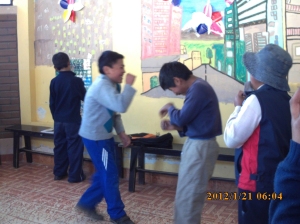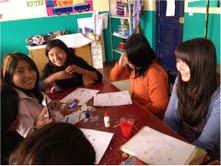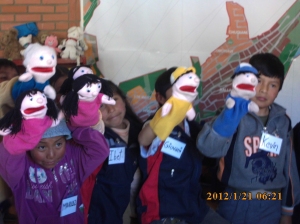Blog Archives
Breaking the Cycle
It’s easy for non-governmental organisations and international development agencies to focus on and highlight the dark side of a country to create empathy and promote an image of desperation. The key focus for a centre in Chuquiaguillo will be to combat violence faced by young people and to draw on their core values so they grow in to responsible, assertive and healthy adults.
As a voice for human rights, International Service works in collaboration with non-governmental organisations to support people and communities in La Paz to prosper, achieve their potential and to work together towards a more equal society. One of the organisations International Service is currently working with is Childfund, whose objectives are to promote human rights for children and adolescents by strengthening youth programmes for education and health. Under the International Citizen Service Scheme, a British volunteering programme, International Service and Childfund have placed British volunteers aged 18-25 years old in various children and youth centres around La Paz to strengthen the Childfund objectives.
The focus of this support is not on the victimisation of individuals or the failures of the wider society, but on the capability and determination of the community to bring about equality and install hope in the young people of La Paz.

Bolivia is known for its rich cultural heritage, however 60% of Bolivia’s population lives under the poverty line and, in turn, 60% of children have their basic needs unmet. This poverty encourages a vicious cycle of violence and abuse with 75% of children suffering some form of physical, emotional or sexual abuse within the home which is attributed to the high level of alcohol consumption within communities[1]. This cycle is continuous, according to UNICEF, as boys are twice as likely to become abusive men themselves when they have been exposed to domestic violence, likewise girls are more likely to accept violence within their marriage when they witness acts of abuse against their mothers, therefore this violence transmits from generation to generation. Levels of schooling are also very relevant as young mothers tend to punish children at home more often however older mothers have a tendency to protect their children. The higher a mother’s level of education also means that she is less likely to punish her children physically or psychologically[2]. This is incredibly significant when you take in to consideration that the average school leaving age is 14 years old in Bolivia[3]. UNICEF have therefore indicated that possible solutions to end the cycle detailed above would be to foster or strengthen sexual and reproductive health policies, reinforce the culture of good treatment among children, adolescents, parents and teachers, and reinforce the policies that combat and prevent violence against women[4].

Ellie Stenson collaborating in creative work with local youth
Because of all these factors, the focus of our work at the centre in Chuquiaguillo is on values, leadership and sexual and reproductive health. As the children come together in classes, a discussion is held on what values we hold ourselves and what we respect in others and aspire to. They have recognised love, care, respect, solidarity, hope and peace among others as values they cherish in life. It is incredibly important that they not only concentrate on where they learned these values but also implementing them so that they become a part of their everyday interaction with people. They also recognised many defects or faults such as discrimination and violence and this first step of acknowledging right and wrong will help give them a consciousness of how they treat others and how they should expect to be treated. A drama class with some younger children also shed light on their views on violence. Using puppets, they acted out situations of violence on the street and at school. No matter how the argument or fight started, it ended in reconciliation and a comprehension that it is not the correct way of voicing opinions and showing emotions.

Children using puppets to explore taboo topics
Over the next few weeks there will be lessons, discussions and activities on leadership and sexual health. It’s important to keep these sessions interactive so as to inspire them to come every week but also to give them a level of communication that they may not receive at school. For this reason, the centre will be working together with the children, volunteers and educators, to renovate the garden into a more welcoming place with flowers and a mural of all the things that matter to the children to act as a constant reminder of their positive future.
These children of La Paz will be able to use the knowledge and skills taken from each session to understand their worth and value in society to enable them to prosper in whatever they do and achieve their full potential. The purpose of these workshops is, not only to become more self-aware but, to provide the students with the skills and competencies to be leaders of their own lives. They will also gain a crucial understanding of equality and be able to implement this in their current and future relationships. Moreover, the children will gain a greater understanding about health and, as they enter their teens and young adult life, have a better awareness of sexual health. Finally, they will be aware of violence and have the chance to grow into healthy young adults that break the cycle of abuse. The time is now to emphasise the importance of family and for each of us to break the cycle.
Written by Francesca Sena
Edited by Liam Hilton
[1] Childfund Website, http://www.childfund.org/bolivia/
[2] UNICEF – Bolivia. Determining factors in violence against children and adolescents, http://www.unicef.org/bolivia/resumen_determinantes_violencia_contra_NNA_bolivia_ENG.pdf
[3] CIA Bolivian fact book, https://www.cia.gov/library/publications/the-world-factbook/geos/bl.html
[4] UNICEF – Bolivia. Determining factors in violence against children and adolescents, http://www.unicef.org/bolivia/resumen_determinantes_violencia_contra_NNA_bolivia_ENG.pdf



